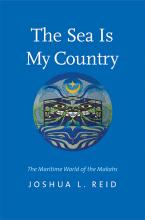For the Makahs, a tribal nation at the most northwestern point of the contiguous United States, a deep relationship with the sea is the locus of personal and group identity. Unlike most other indigenous tribes whose lives are tied to lands, the Makah people have long placed marine space at the center of their culture, finding in their own waters the physical and spiritual resources to support themselves. This book is the first to explore the history and identity of the Makahs from the arrival of maritime fur-traders in the eighteenth century through the intervening centuries and to the present day.
Joshua L. Reid discovers that the “People of the Cape” were far more involved in shaping the maritime economy of the Pacific Northwest than has been understood. He examines Makah attitudes toward borders and boundaries, their efforts to exercise control over their waters and resources as Europeans and then Americans arrived, and their embrace of modern opportunities and technology to maintain autonomy and resist assimilation. The author also addresses current environmental debates relating to the tribe’s customary whaling and fishing rights and illuminates the efforts of the Makahs to regain control over marine space, preserve their marine-oriented identity, and articulate a traditional future.
